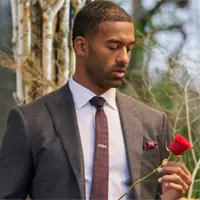The Bachelor demonstrated how little it cared about Matt James
-

In the aftermath of the After the Final Rose special, "it was hard not to notice how invested the special seemed in protecting (Rachael) Kirkconnell—and how uninterested it seemed in protecting the Bachelor himself," says Laura Bradley of the first Black Bachelor. James’ selection as Bachelor, she adds, "was meant to indicate a step forward for a franchise that has historically (and repeatedly) fumbled on race. But as his season unfolded, viewers quickly noticed how little time we spent learning about James and many of his contestants; an outsized amount of time went, instead, to infighting largely between and instigated by white contestants. The show exploited James’ strained relationship with his father for drama without considering the effect that such a stereotypical portrayal of a Black man with an absentee father could have, absent any context about their specific history. And rather than address Kirkconnell’s disturbing social media history in real time, The Bachelor’s network and producers opted instead to do what they always do, when they can: Avoid commenting in the hopes of currying more interest (and better ratings) in the finale." Like James, Lindsay had to contend with a suitor who also had a racist social media history. If the Bachelor franchise has shown us anything, it’s that they don’t know how to protect people of color. They only know how to exploit them," Lindsay said of James' season The Ringer's Bachelor Party podcast. Bradley adds: "Rather than illuminate to Lindsay what was going on, producers did what they normally do about contestant in-fighting—which is to say, nothing. In forcing Lindsay to navigate the conflict without all of the information about (Lee) Garrett’s behavior, however, the show was putting its Black lead in a uniquely compromising position. Beyond the unfairness, it was dangerous." Bradley adds that The Bachelor franchise needs a reckoning when it comes to race. "Alongside these vital diversity efforts, perhaps, should also come a broader discussion about what this franchise is and how it operates—how it builds its narrative out of people’s lives and frames them for public consumption, and how it determines what is 'on' and 'off' limits," says Bradley. "How its audience follows white contestants at higher rates than contestants of color on social media. How sexist and racist bullying have become rampant within Bachelor Nation’s online circles. In other words: Perhaps it’s time for all of us to reconsider where the show’s ethical boundaries, and our own as viewers, should fall."
ALSO:
- The Bachelor screwed over Black women most of all: "Seeing Matt James as The Bachelor was like an awakening," says Brooke Leigh Howard. "It was as if the franchise was finally opening itself up to new possibilities—the prospect of being more cultured and diverse. Having a Black man at the center of its flagship series signaled mainstream acceptance that Black love is powerful, and would chip away at the ugly stereotypes about Black family and relationships in the media. Rather than proving Bachelor Nation’s inclusivity, the season ultimately demonstrated how, in the words of Malcolm X, the most disrespected person in America is the Black woman. A season that should have been historic in a positive sense ended up revealing how ass-backwards the franchise truly is." She adds: "No matter what the Black women did, how amazing they were, how great and deep the conversations were they had with Matt, it didn’t matter. He still ended up choosing the racist white lady. Yes, the show is trash for not putting in the work and vetting its contestants the way it should have. There’s no way that Rachael should have participated in Season 25. However, I’m truly appalled with Matt James. This man was supposedly searching for the love of his life. For the duration of the show, he was doing nothing else but dating these women. And during that time, he never had a deep conversation about race and social politics with Rachael? It seems so lazy and hypocritical considering that he’d had those sorts of talks with the women of color on the show, as they bonded over stories of trauma. While those women revealed their scars to Matt, and relived the emotional pain of what it means to be a minority in this country, he never once thought about bringing up his experiences to Rachael—a woman who he chose over dozens of other women. A woman who he contemplated proposing to. A woman with whom he thought about creating a family. If Rachael’s business did not make the rounds on the internet and become mainstream news, I’m not sure if Matt would have ever found out. Their relationship was not emotionally deep enough for him to ask this woman why she may have been dressed up for an Old South party in a photo. And if he did find out, he may have even stayed if it weren’t for the ensuing public backlash and damage to his ego. After watching this season of The Bachelor, I was reminded why I tuned out in the first place: there is no space for Black women to be seen as winners in the franchise."
- Matt James jokes about Googling a therapist
- Emmanuel Acho: Michelle Young and Rachael Kirkconnell making up was left on the cutting-room floor
TOPICS: Matt James, ABC, The Bachelor, Michelle Young, Rachael Kirkconnell, Rachel Lindsay, Reality TV
More Matt James on Primetimer:- Matt James Rips The Bachelor: 'The Show Missed the Mark' on Black Representation
- The Bachelor's Matt James recalls the "hard conversation" he had with Rachael Kirkconnell after her Antebellum party photos surfaced
- Why crypto is all the rage among Bachelor franchise alums
- The Bachelor's Matt James is writing his memoir
